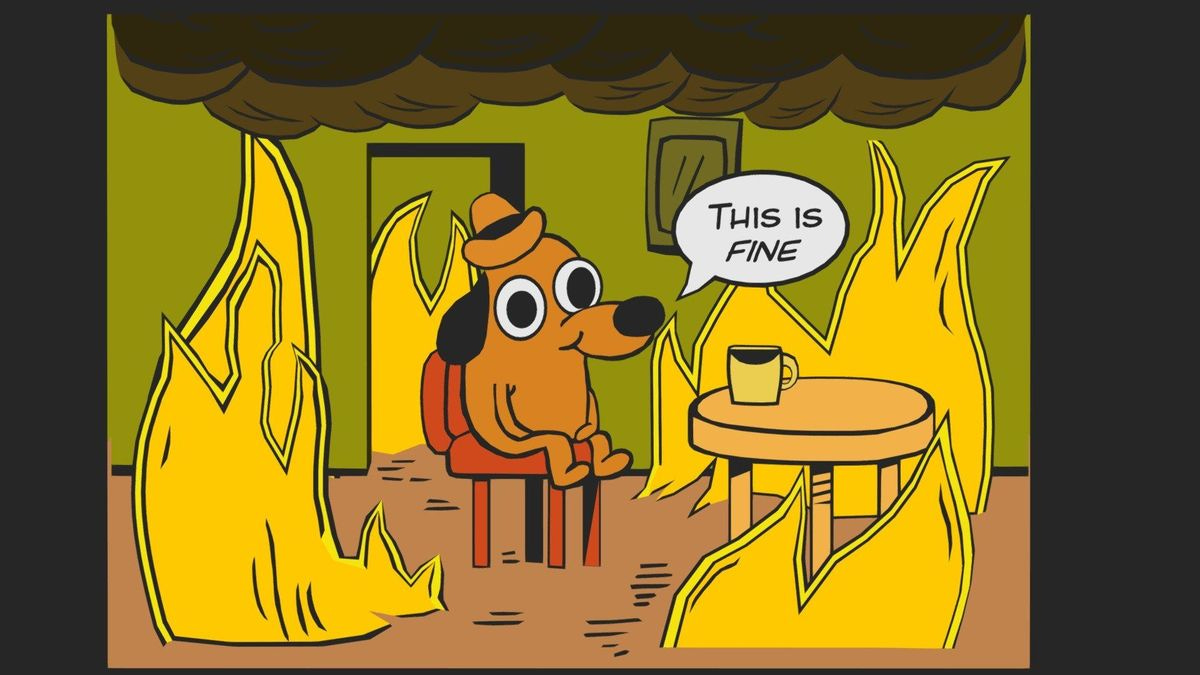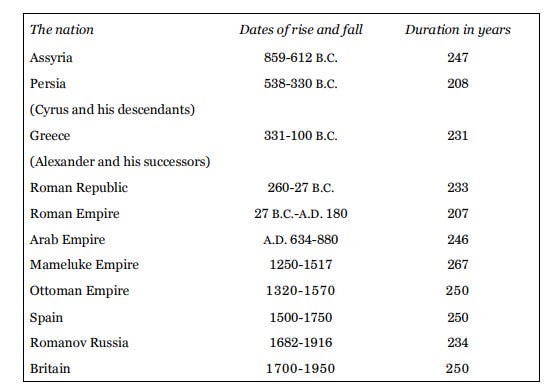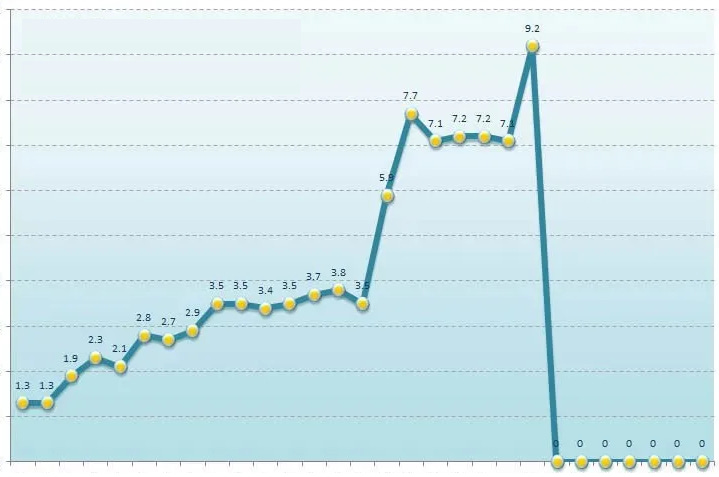The Curse of Interesting Times
Things are the most interesting they've been in 80 years, 250 years, and, well, ever.
The Chinese curse their enemies with the phrase “may you live in interesting times.”
Or, rather, Americans think that Chinese curse their enemies like that; according to Infogalactic, “despite being widely attributed as a Chinese curse, there is no equivalent expression in Chinese.”
Fortunately, there’s an actual Chinese phrase that’s much more interesting. It’s found in a 1627 short story collection by Feng Menglong called Stories to Awaken the World, and it states "better to be a dog in a peaceful time, than to be a human in a chaotic times.” And to be a dog in 17th China didn’t mean being a beloved fur baby with your own YouTube channel. It meant being a workbeast that got eaten when times were lean. The Chinese still have an annual dog meat festival.
Whichever adage you prefer, our times are both chaotic and interesting. In fact, they are monumentally interesting — they are so interesting as to beggar coherent description, to put to shame historical comparison, so remarkable that every single one of us would be justified in screaming from the rooftops in shock and awe. And yet we don’t. We keep calm and carry on, sturdily gripped by our bias for normalcy, by our human ability to adapt to even the most bizarre circumstances. It’ll be fine, we tell ourselves. This is fine.
But what if we put aside our normalcy bias for a moment and look at how just how “interesting” our times really are? What do we see then?
Once Every 80 Years…
Once every 80 years, a country enters a crisis. That is, at least, the assertion of Strauss-Howe Generational Theory. According to Strauss and Howe, human history is organized into repeating patterns marked by four “turnings”: the High, the Awakening, the Unraveling, and the Crisis. Each turning is approximately 20 years long, and an entire cycle of four turnings is therefore about 80 years long. According to Strauss and Howe, American history looks something like this:
American Revolutionary Crisis, 1765 - 1785
American Civil War Crisis, 1855 - 1875
Great Depression and World War II Crisis, 1930 - 1950
YOU ARE HERE, 2010 - 2030
If we believe Strauss-Howe Generational Theory, we are in the midst of what they call a Fourth Turning — a moment of Crisis.
Are we in a Fourth Turning? I certainly believe so. As I documented in Running on Empty, the United States now stands at a financial precipice. US inflation is at its worst in 40 years because the monetary system we established under Truman and rejuvenated under Nixon is now about to collapse. With that crisis have come challenges from a resurgent Russia and burgeoning China that could lead to a Third World War or, at best, a post-American world order. The Thucydides Trap has never been so close to springing. It’s no wonder then that US fears of nuclear war have surged to levels not seen since the Cold War. But unlike the Cold War, no one wants to ‘ask what they can do for their country’ anymore. US Army recruitment is at its worst in 50 years. And why would they want to serve? Our nation is divided into warring camps. US partisan distrust of the opposing party is at its worst in 30 years.
All right. That all sounds bad. But if Strauss-Howe Generational Theory is true, the Fourth Turning will be over in about 5-10 years and we’ll move into the next Turning, the High. And those are awesome!
But what if we won’t be heading into another high?
Once Every 250 Years…
Once every 250 years, a great power falls into decline and ruin. Or so asserts Sir John Glubb in his remarkable essay The Fate of Empires and Search for Survival. (And thank you to Douglas for sending me this link!) Glubb has made a comprehensive review of the rise of fall of the great nations of world history, and found they invariably stand tall for just 200 and 264 years, with an average duration of 250 years between their rise and fall.
“The life-expectation of a great nation,” Glubb wrote, “commences with a violent, and usually unforeseen, outburst of energy, and ends in a lowering of moral standards, cynicism, pessimism and frivolity.” Glubb believed that the United States was one of those great nations and saw it rising and falling occur along a similar cycle:
The United States arose suddenly as a new nation, and its period of pioneering was spent in the conquest of a vast continent… the subsequent life history of the United States has followed the standard pattern—the periods of the pioneers, of commerce, of affluence, of intellectualism and of decadence.
Glubb considered the age of Woodrow Wilson to be the “high noon” of the United States, the moment after which it passed into decadence that would lead to its inevitable fall. The age of Wilson in America, he compared to the age of Augustus in Rome, the age of Sulamain the Magnificent in the Ottoman Empire, and the age of Queen Victoria in Britain. What comes after high noon is the warmth of the afternoon sun… and then the fall of night.
And there is abundant evidence that it’s eventide in America. Consider:
US government debt levels are the worst they have ever been.
US population growth rates are the worst they have ever been.
US worries about race relations are the worst they have ever been.
US rates of trust in government are the worst they have ever been.
US rates of church attendance are the worst they have ever been.
US home ownership rates for young people are the worst they have ever been.
I could have added a hundred more bullet points, and every single one of them would point towards American decline. This is not doomsaying. This is reality.
Now, it’s common among the dissident right to compare the United States to Rome. There’s much talk of “optimates” and “populares,” of barbarian threats, of crossing the Rubicon, all designed to compare America in 2023 to the Roman Republic in 27 BC. And we might be there. But we could just as well be at the moment of transition in 180 AD, when Rome slid into what came to be called the Crisis of the Third Century. Perhaps our future is not one of a rising Caesar, but of a heroic but doomed Aurelian Restitutor Orbis, desperately trying to hold together a collapsing empire.
Or, it could be even worse than that.
Once Ever in Human History
In my essay last week I compared the Whig and cyclical theories of history. According to the cyclical theory of history, human civilization rises and falls in patterns of the sort described by Strauss, Howe, Glubb, and others. A cyclical historian sees the historical record like this:
According to the Whig theory of history, human civilization rises over time in a state of progressive improvement that builds on all that has come before. A Whig historian sees the historical record more like a stock market index. There are rises and falls, yes, but the overall slope of the curve is noticeably upward. Sure, we might be in a temporary period of decline from a local high, but things will go back up, up, up…
What if they are both wrong? What if neither a progressive or cyclical theory can account for “vantablack swans” of such singular impact as to wipe out dinosaurs or destroy all human life? What if we’re about to discover the explanation for the Fermi Paradox? What if the Singularity is real, but it’s not a moment of transcendence but a moment of annihilation?
What if we are at a moment of decline that comes not just once every 80 years, not just once every 250 years, but once ever — a uniquely destructive moment in the history of our species? In other words, what if the actual course of human history is going to look more like…this:
We won’t know until it happens, of course, and we won’t know then either, because we’ll either be extinct or we’ll too busy racing V8 interceptors against Lord Humungous to rule the wasteland. (You did make sure to buy a black V8 muscle car as part of your prepping, right?)
But we can ponder it now. Are we living at a singular moment in history? I think we are. Consider the facts.
There are more human beings alive today than at any moment in history. About 1 in every 15 humans in the entire 200,000 year history of our species is alive right now. Is it too many for our planet to sustain? How could we know? We’ve never been here before.
That many humans takes up a lot of space. There is now less wildlife on the planet than at any moment in human history. The number of wild animals alive today is half what it was 40 years ago, and orders of magnitude lower than in earlier eras. Have we upset a crucial ecological balance and accidentally doomed ourselves? I have no idea and neither does anyone else.
Likewise, insect biomass is depleting rapidly and may be at all-time lows. Studies have found a 76% decrease in winged insect biomass in the last 27 years. Does the disappearance of the bees presage the disappearance of the human species?
Or maybe the problem won’t be too many people, but too few. Birth rates are declining globally and catastrophically. China, Japan, France, Germany, and countless other nations are aging so rapidly that their populations will be halved within a century. Nothing any government has tried has been able to turn this tide, no social policy, no incentive. Is our fate to just fade away?
Perhaps microplastics are to blame. After all, there is more pollution from microplastic particles than at any moment in human history. There is no longer any place on Earth that is free of their pollution. They’re probably making the frogs gay. Have we poisoned ourselves with ruinous toxins that will destroy our desire or ability to reproduce?
We also can’t fail to mention that CO2 concentration is higher than ever in human history. No, that doesn’t mean Greta is my personal hero. But it is something unique to our moment that might be a black swan.
CO2 rates have risen from use of fossil fuels, but use of fossil fuels is becoming increasingly expensive. The energy return on energy invested for fossil fuels is probably lower than at any moment since the industrial revolution began. It has declined by 23% in the last 16 years, according to the linked source. Some experts in EROEI believe we may already be below the point at which fossil fuels can sustain an industrial civilization. And I don’t mean to imply that Green Power will save the day — I mean to imply we might be doomed because it won’t. We can’t sustain our population without energy.
But maybe we’ll electromagnetically poison ourselves before then. The radio frequency power density on Earth was 1,000 times higher than natural levels by the 1950s, 1,000,000,000 natural levels by the 1980s, and 100,000,000,000,000,000 times natural levels by the 2010s. I sure don’t know whether a hundred-quadrillion increase in RF power is safe for humanity in the long term. No one does — the power density and the rate of increase are entirely unprecedented.
Of course, all that RF power is going towards making more people more digitally connected than ever before in human history. But is that a good thing? Has our interconnected digital network set the stage of peace and understanding? Or have we created the possibility for our own totalitarianism enslavement?
Worse, have we used our computing power to create our own exterminator? A full one third of experts surveyed have fears that AI may destroy us, including luminaries such as Elon Musk, Stephen Hawking, Jaan Tallin, Bill Gates, and even the staid Oxford dons at the Future of Humanity Institute. Already, a “dual use AI” has been shown to be able to discover new chemical weapons that are deadlier than VX gas with less than 6 hours of training. The rise of artificial intelligence may be the most singular and momentous event in, not just my lifetime, but any human’s lifetime.
To this list of world-historical moments one could add the recent COVID pandemic, which saw a level of social control imposed that was unparalleled in history, as well as the distribution of an experimental vaccine to more people than ever before.
Is it any wonder the doomsday clock is closer to midnight than ever before? Our world is unquestionably more “interesting” than it’s been in 80 years, and probably in 250 years, and, maybe, in the course of all of human history.
If there’s one thing I want you to take away from today’s essay, it’s this: all of this is China’s fault. (It’s their curse after all.)
Contemplate this on the Tree of Woe…







Based on this thread, I have been able to categorize my readers into several tribes based on their view of the future:
1. Hopespeakers. Things aren't going to get that bad.
2. Doomhopers. Things have to get worse before they can get better.
3. Doomsayers. Things will get worse... before they worsen even more.
4. Doomwakers. Things are already bad. Wake up sheeple, your prosperity is a lie!
I will not mention names. You know which tribe you are in. :-) Carry on with the woe, comrades.
I could quibble over some of these items. For example, before the home mortgage deduction and FHA, this country had an awful lot of people renting. Subsidized home ownership was seen as a means of fending off communism. And trust in government has been violently low in the past as well.
But on the whole I agree. And I dare say that this could well be the Big One on the way. We are experiencing a great Falling Away that is unprecedented in Christendom. Over my lifetime the US has gone from being an especially Christian first world nation to being a crusader for sodomy. And this business of banks and other providers cutting off businesses which don't kowtow to transexuals reminds me greatly of the Number of the Beast prophecy.
Humans have the technology to implement many of the dire events of Revelations. Nukes can provide the fire and brimstone. Recombinant DNA can provide the plagues. Robotic drones could be the prophesied "stinging insects." We don't have the tech to divert an asteroid to fulfill the Wormwood prophecy, but it's on the way. There's money in them thar asteroids, and SpaceX has been busy.
There is no Temple yet to desecrate, so we probably have a few decades.
And this could be a false alarm.
I am of the tentative opinion that humans have a bit of a say in the matter of when the dire events befall. See the last chapters of Deuteronomy or the Book of Jonah for precedents.
And so I attempt to fight back against forces that resemble the prophesied AntiChrist.